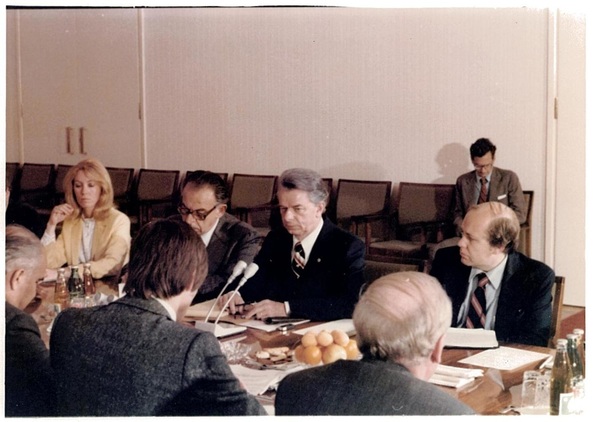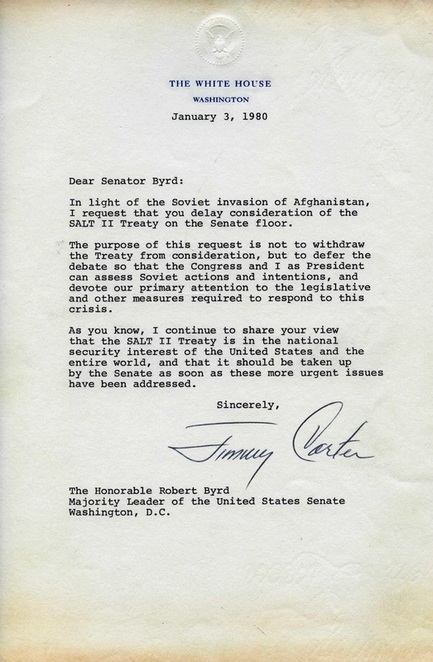|
By Jody Brumage In the summer of 1979, Senate Majority Leader Robert C. Byrd led a delegation to the USSR to speak with Soviet President Leonid Brezhnev in the wake of Senate debates over the second Strategic Arms Limitation Talks (SALT II) Treaty. The meeting was accounted in a variety of documentary and photographic records now housed in the Robert C. Byrd Congressional Papers Collection at the Byrd Center. SALT II was proposed to continue the efforts of the first SALT Treaty which had been signed by President Richard Nixon and President Brezhnev in 1972. SALT I mandated a freeze on the number of ballistic missile launchers operated by both the US and the Soviet Union and called for a dismantling of some outdated intercontinental ballistic missile (ICBM) launchers. In continuation of these efforts, SALT II proposed to halt the manufacturing of strategic nuclear weapons and infrastructure. The negotiations occurred over seven years during the Nixon, Ford, and Carter Administrations. By 1979, a treaty had been negotiated by Carter and Brezhnev and the leaders met in Vienna on June 18 of that year to sign the treaty. On June 22, Carter submitted the treaty to the Senate for ratification. Senator Byrd issued a letter to the members of the Senate describing the debate process and noting the sensitive nature of the treaty. Senator Byrd also made arrangements to meet with Brezhnev to express his views on the treaty and to describe the process of Senate ratification. The meeting between Senator Byrd and Brezhnev took place on July 4, 1979 at the Soviet President’s vacation retreat, Sosnovka. Senator Byrd delivered his remarks, which were later printed in the Congressional Record. According to a staff report, Brezhnev stated that “SALT II is built on the principle of equality and does not afford either side a unilateral advantage.” Many US citizens disagreed with this sentiment and Senator Byrd expressed this view to Brezhnev, stating that he himself had yet to decide if he would support ratification of the treaty. The exchanges between Byrd and Brezhnev grew anxious at times, especially over the topic of verification. SALT II prohibited each nation from interfering with the other’s verification of compliance procedures, but did not address ways in which verification could be impeded by disguising missile installations or by other means. In response to the verification issue, Senator Byrd, along with Senator Birch Bayh (D-IN) cosponsored an amendment to the SALT II Treaty, sponsored by Senator Walter Huddleston (D-KY). Amendment 518 to the SALT II Treaty would have required the president to disclose any verification reports to the Senate for review. Senator Byrd ultimately supported the treaty, but his constituents in West Virginia did not share in supporting President Carter’s efforts on SALT II. Constituent letters and petitions poured into the Senator’s office. This was not the first time Senator Byrd’s support for the Carter Administration would pit himself against the views of his constituents. Senator Byrd received similar opposition when he supported the 1977 Panama Canal Treaty. After half a year of debate and deliberation in the Senate, the chances of ratification for the treaty further eroded in late 1979 when the Soviet Union invaded Afghanistan. On January 3, 1980, President Carter wrote to Senator Byrd asking him to halt floor debate on the treaty in light of the Soviets’ breach of US trust. Senator Byrd agreed with President Carter’s request and issued a press release announcing the delay while still stating his support for the treaty. The Senate never ratified the SALT II Treaty, even though both nations honored the agreement until it expired in 1985. References:
*All documents linked in the blog are from the Robert C. Byrd Congressional Papers Collection. Pfaltzgraff, Jr., Robert L. “The Superpower Relationship and U.S. National Security Policy in the 1980s.” Annals of the American Academy of Political and Social Science 457 (September 1981): 186-196. U.S. Department of State. “Treaty Between the United States of America and the Union of Soviet Socialists Republics on the Limitation of Strategic Offensive Arms (SALT II).” Accessed May 26, 2015. http://www.state.gov/t/isn/5195.htm#narrative Comments are closed.
|
Welcome to the Byrd Center Blog! We share content here including research from our archival collections, articles from our director, and information on upcoming events.
Categories
All
Archives
July 2023
|
Our Mission: |
The Byrd Center advances representative democracy by promoting a better understanding of the United States Congress and the Constitution through programs and research that engage citizens.
|
Copyright © Robert C. Byrd Center for Congressional History and Education
|



 RSS Feed
RSS Feed
